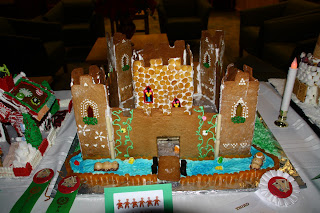"Who am I? Where am I? And who in the world thought of making gingerbread into a rabbit shape for Christmas?!" His tiny gingerbread brain whirling with first thoughts, he looked around with his one eye. Unfortunately, having never seen anything before, he had no idea what he was seeing now. Having no discernible limbs, he was not able to stumble to his feet, but he found he was able to scoot a little, so he began to scoot along the surface he was on.
He was scooting along merrily when suddenly he felt something pushing against him. Finding that he could speak, in spite of the limitations of his gingerbread voice box, he spoke: "Hello? Someone there?"
"Cluck, cluck, cluck," another voice answered.
"Hmm," he thought. "They must not speak ginger-rabbit." Cleverly switching to the trade language of all gingerbread creatures (gingerese) he tried again. "Hello? Who are you?"
This time the answer came back in oddly accented gingerese, "Hello? I am Henrietta the gingerbread hen. Who are you?"
Fredrick tried to smile engagingly as he answered, but found it impossible without a mouth. "I am Fredrick, the gingerbread rabbit!"
"A pleasure to meet you sir, though a rabbit is hardly a common gingerbread creature to come across." Henrietta sniffed with a sense of superiority.
"Well, a hen is hardly usual at Christmas time either," retorted Fredrick.
It might have turned into a full-fledged argument if they had not been interrupted at that moment by a loud sniffle. Looking around with their sugar eyes they saw this:
Henrietta gasped. "Are you a wolf? Please don't eat me!"
A low moan escaped the creatures gingerbread lips. "No, I'm not a wolf. I was meant to be a reindeer but the person making me carelessly allowed my antlers to fall off. So now I'm Caleb, the gingerbread dog, and I'm just as much of a Christmas misfit as either of you. Plus, I don't even have an eye so I can't even cry about it."
As Henrietta and Fredrick scooted closer to Caleb in an attempt to offer him some form of comfort, they heard a small "quack!"
"I beg your pardon!" said Fredrick who had felt one of his ears jab something.
"You really must watch where you put those things," a small, squeaky, and yet pompous voice replied. "I," it continued, "am Handel, the gingerbread duck."
Fredrick felt an appalling compulsion to giggle at this ostentatious pronouncement but quickly stifled it. While he was choking back his mirth, Caleb, showing a surprising amount of curiosity for a gingerbread dog with no eye, questioned, "What an odd name. Why are you so called?"
The duck put his bill in the air proudly, "As you no doubt realize, ducks are not associate with Christmas. Handel the composer, however, is. Thus, by calling myself Handel I find a way to fit into this Christmas environment."
The other gingerbread animals tried to applaud this display of brilliance but found that they had no hands and so gave up on that show of support. They were debating the wisdom of all changing their names to reflect a more Christmas-y spirit when they noticed one more gingerbread creature scooting up to their group. They looked at him expectantly.
"Hi! I'm Ian the gingerbread donkey!" said Ian the gingerbread donkey.
"My, what a friendly fellow you are," said Henrietta.
Fredrick glanced at him suspiciously. "You look more like a horse to me," he said.
Ian snorted. "My name is Ian," he said, "which pretty much means I'm a donkey."
"Oh. Good point."
Fredrick looked around. He wasn't sure how a rabbit became a leader of a gang of gingerbread creatures, but that was clearly what had happened. He made his first pronouncement as a leader: "Friends, country-men, fellow gingerbread misfits! Clearly we have been called into existence for a reason! Christmas must need saving! And we will save it!"
Caleb looked confused. "What, exactly, is Christmas, and how, exactly, does one go about saving it?"
No one answered. They all glanced around uneasily, unwilling to admit that none of them had any clue how to answer those questions.
Handel glared knowingly at Caleb. "I know what Christmas is, but I don't have the time or patience to explain it to you fools." He sniffed, as if to show off his superior nostrils.
The confused silence was broken by Henrietta, who had just broken up with her boyfriend, Roger the Rooster. She thought that maybe saving Christmas could have something to do with getting revenge on him. They all pictured that for a moment...
...and then decided that whatever Christmas was, it probably had very little to do with sticking knives through a fake man in search of catharsis. Henrietta was a little sad that her idea had been rejected, but recovered quickly when they visited a huge Christmas tree and Handel the duck asked her out on a date.
With that crisis averted, Ian the donkey took a moment to ponder. "Hmm...." he thought. "We are all sort of barn animals...and I seem to somehow know that the first Christmas took place in a stable or something. Maybe we should visit our roots." He shared this thought with the other gingerbread animals. Fortunately, none of them recognized the incongruity of having gingerbread animals in a barnyard so they set off to make Ian's idea a reality.
Though they nearly froze their gingerbread ears and tails off as they tramped about the snow of the barnyard, they realized how blessed they were to be alive in a world where God had become flesh, and how fortunate they were to have a gingerbread "family" to be with during the season.
And with that, feeling confident that they had saved Christmas at last, they rode off into the sunset.
...they may have also been eaten, as tends to happen with gingerbread...





















